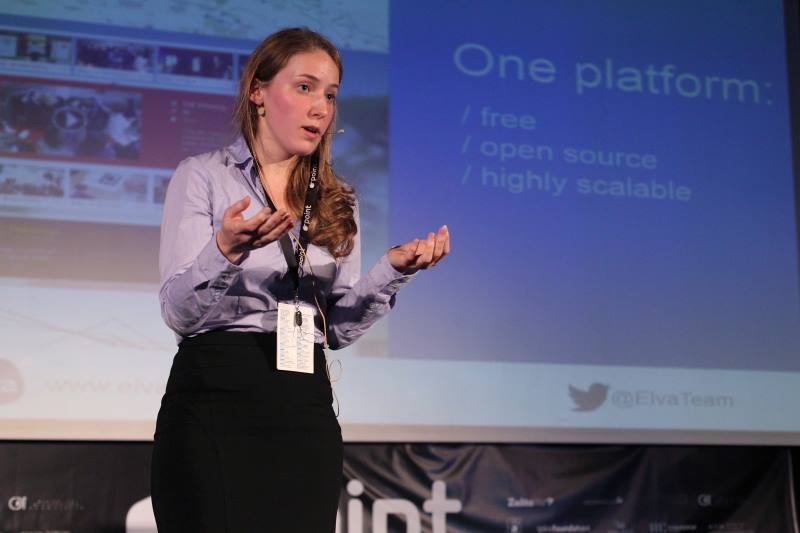Mapping Local Needs
 Taylor Braun-Dorrell presented Elva platform for monitoring local needs around the world.
Taylor Braun-Dorrell presented Elva platform for monitoring local needs around the world.
At the beginning of her presentation Taylor pointed out that today there is a number of applications for this purpose, but what is really crucial is understanding the specific needs of local communities.
“There are differences from community to community, and they are reflected in the varying use of different technologies. In its work Elva consumes 20% of the capacity to develop new technologies, and 80% of its capacity is spent on understanding the specific needs of local communities, “says Dorell.
In Georgia ELVA is focused on enabling fast communication between the various actors of civil society. So Elva has developed a platform that gives organizations the ability to collect various data via SMS, applications for mobile phones and the web, and their very simple visualization through those tools, including maps, tables, diagrams and other ways.
“When the data is visualized it’s much better understood. With the help of information visualization it’s is easy to put them into context so they can be understood by everyone, “says Taylor.
Elva started this project two years ago in Georgia by reporting on conflicts in South Ossetia and spreading of information that was relevant to the safety of the community through the project Community Safety Network. The success of these platforms is reflected in the fact that it’s been applied in other conflicts around the world, including Libya and Thailand, and the principle of its operation is very simple. With the help of local reporters information are collected and then entered in the platform and they become visible to everyone.
Taylor also presented the tools that Elva developed for monitoring the electoral process. These tools serve civil society organizations to effectively monitor the election process and all the problems that happen in and around, and to, in a very efficient and fast way, inform the general public about these problems.
“The aim of this platform is to empower local organizations that have the knowledge but do not have the resources to effectively supervise this process. In this way, civil society organizations can present information in a very simple and automated way, “says Dorrell.
Taylor emphasized the importance of segmentation of data in order to obtain the most relevant information.
“In some cases, instead of collecting large amount of data that can be in text form or a report, it’s easier to ask relevant questions to the people. That can be done in the form of a questionnaire. In this way, we get exactly the information that we are interested, and that is better than filtering it from broad statements and reports. This way we get information from a large number of people being that the reporting is completely anonymous “said Dorrell.
In addition to empowering the organizations by using Elva applications, with visualization they get a very powerful tool for advocacy in their communities.
Taylor presented the platform Friendly roads, developed in Georgia, which allows easy reporting of traffic accidents, and the condition of the roads in this country. This platform has enabled the connection between citizens and decision-makers in this country. Citizens report problems that occur in traffic, and these reports are available to the authorities as proof.
With the help of visualizations local organizations can show different problems that exist in a better way and so they can advocate for change more effectively.
“Collecting data is important, but it is only important if it can be used to get things changed for the better,” concluded Taylor.